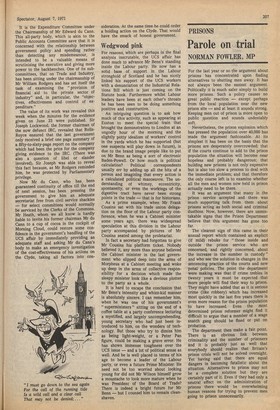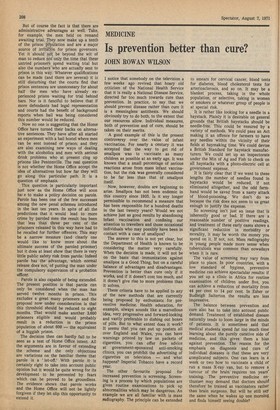PRISONS
Parole on trial
NORMAN FOWLER, MP
For the last year or so the argument about prisons has concentrated upon finding alternatives to shutting men away. It has not always been the easiest argument. Politically it is much safer simply to build more prisons. Such a policy causes no great public reaction — except perhaps from the local population near the new prison site — and at least it sounds strong. Keeping men out of prison is more open to public ,question and sounds undeniably soft.
Nevertheless, the prison explosion which has pressed the population over 40,000 has made the argument fashionable. At its simplest it has been on the basis that the prisons are desperately overcrowded; that if the courts continue to add to the prison population the situation will become near hopeless and probably dangerous; that building new prisons is not only expensive but is also too slow a process to deal with the immediate problem; and that therefore the only course left is to examine whether all the men and women now held in prison actually need to be there.
It was an argument that many in the prison service accepted and there was much supporting talk from them about prisons acting as both social and criminal dustbins. Now, however, there are unmis takable signs that the Prison Department believe that this argument has gone too far.
The clearest sign of this came in their annual report which contained an explicit (if mild) rebuke for "those inside and outside the prison service who are concerned, and rightly concerned, about the increase in the number in custody" and who see the solution in changes in the sentencing practice of the courts and new penal policies. The point the department were making was that if crime trebles in twenty years it must be expected that more people will find their way to prison.
They might have added that as it is serious crime (like robbery) which has increased most quickly in the last five years there is even more reason for the prison population to have increased. Even the most determined prison reformer might find it difficult to argue that a member of a wage snatch gang should be fined or put on probation.
The department then make a fair point. There is an obvious link between criminality and the number of prisoners and it is probably just as well that everybody should realize that Britain's prison crisis will not be solved overnight. Yet having said that there are equal dangers in becoming fatalistic about the situation. Alternatives to prison may not be a complete solution but they are certainly part of it. Even if they had only a neutral effect on the administration of prisons there would be overwhelming human reasons for trying to prevent men going to prison unnecessarily.
But of course the fact is that there are administrative advantages as well. Take, for example, the men held on remand awaiting trial. They now make up a tenth of the prison Population and are a major source of irritadon for prison governors. Yet it should ndt be beyond the wit of man to reduce not only the time that these untried prisoners spend waiting trial but also the numbers who are actually sent to prison in this way. Whatever qualifications can be made (and there are several) it is still disturbing that the courts find that prison sentences are unnecessary for about half the men who have already experienced prison waiting for trial behind bars. Nor is it fanciful to believe that if more defendants had legal representation and courts had the benefit of background reports when bail was being considered this number would be reduced.
Now no one is suggesting that the Home Office have turned their backs on alternative sentences. They have after all started an experiment with a bail hostel where men can be sent instead of prison; and they are also examining new ways of dealing with the alcoholics and men with serious drink problems who at present clog up prisons like Pentonville. The real question is not whether the Home Office accept the idea of alternatives but how far they will go along this particular path. It is a question of emphasis.
This question is particularly important just now as the Home Office will soon ha■ e to make a policy decision on parole. Parole has been one of the few successes among the new penal schemes introduced in the last ten years. In spite of all the predictions that it would lead to more crime by paroled men the result has been that less than three per cent of the prisoners released in this way have had to be recalled for further offences. This may be a narrow measure (and clearly one would like to' know more about the ultimate success of the paroled prisoner) but it does at least show that there is very little public safety risk from parole. Indeed parole has the advantage, which normal release does not, of putting the man under the compulsory supervision of a probation officer.
Parole is also capable of being extended. The present position is that parole can only be considered when the man has served twelve months in prison. This excludes a great many prisoners and the proposal now under consideration is that this threshold should be reduced to eight months. That would make another 3,600 prisoners eligible and would probably result in a reduction in the prison population of about 600 — the equivalent of a biggish prison.
The decision then can hardly fail to be seen as a test of Home Office intent. All the arguments are in favour of extending the scheme and the only objections are variations on the familiar theme that parole is a 'let-off.' With parole it is certainly right to take into account public opinion but it would be quite wrong for its development to be prevented by fears which can be proved to be groundless. The evidence shows that parole works and the Home Office will not be lightly forgiven if they let slip this opportunity to extend it.



































 Previous page
Previous page